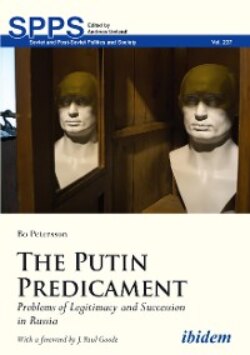Читать книгу The Putin Predicament - Bo Petersson - Страница 13
На сайте Литреса книга снята с продажи.
Legitimacy in non-democratic states
ОглавлениеWhether or not legitimacy is a concept that applies in non-democratic settings has been hotly debated over the years. As laconically argued by one proponent of the idea that legitimacy is exclusively relevant for democracies, “only a democratic government can be legitimate” (Buchanan 2002: 689). Other scholars have equally steadfastly argued that the concept is relevant beyond the democratic nation-state context (Omelicheva 2016, Mazepus et al 2016, Heberer and Schubert 2008, Schlumberger and Bank 2001, Holmes 1997, Alagappa 1995, Chung Yoon-Gun 1993, Rigby 1982). To get out of the ideological quagmire, suffice it to suggest that the widening of the applicability of the concept of legitimacy beyond the domain of democratic states becomes possible if the analysis concerns perceived legitimacy, not legitimacy as an absolute or normative value (Arnesen et al 2019: 4). My rationale for accepting the stretching of the concept is simply that it is important for political scientists to analyze what holds states together, short of repression, clientelism, and bribery (Pavroz 2020, Omelicheva 2016, Goode 2012, 2020). This is regardless of whether the legitimizing grounds are democratic or not, since the consequences of the attainment of the societal stability that can only come from legitimacy are profound for domestic politics and the outward behavior of any state. Even if some analysts claim that coercion and clientelism in combination are sufficient to keep non-democratic rulers in power (Orange 2019), I maintain that successful legitimation, in relation to the populace and to contending elites, comes across as the most sustainable mechanism for the political survival of hybrid and authoritarian regimes (Kailitz and Stockemer 2017, Goode 2012).
In such systems, contextual circumstances are fundamentally different from democracies. Factors other than strict legality and adherence to constitutional frameworks, namely, indoctrination, clientelism, and the use of force, play crucial roles (Pavroz 2020, Orange 2019, Feldmann and Mazepus 2017, Mazepus et al 2016). The concepts of legitimacy and regime support therefore mean partly different things, depending on whether democratic or non-democratic states are being discussed (Nathan 2020). Nevertheless, in sheer economic terms, legitimacy comes cheaper than repression, so even an authoritarian regime will gain from achieving acquiescence through non-violent means (Omelicheva 2016). Unless a regime is willing to sustain itself through violence and repression alone, it needs to seem support-worthy to the popular majority. Finding ways of assessing the political dynamics to attain legitimacy is therefore key to the understanding of the relative longevity not only of democratic polities but also hybrid and authoritarian regimes (du Boulay 2020, Goode 2020, 2012).
For the researcher there is a methodological dilemma involved in studying legitimacy in hybrid and authoritarian states, as popular opinions and perceptions are for several reasons difficult or ethically objectionable to investigate there (Omelicheva 2016, Koesel and Bunce 2012). This was briefly touched upon above. Either the respondents to interviews and surveys are reluctant to reveal what they think, or it is irresponsible to put them at risk by asking them in the first place. Several researchers therefore argue that it makes little sense to claim or attempt to study legitimacy in such settings; instead, what one can reasonably do is to study the legitimation claims made by the regimes. The focus of study should therefore shift from opinions of the electorate to the ways in which the political elite legitimizes its rule and tries to communicate its claims to the public (du Boulay and Isaacs 2019, von Soest and Grauvogel 2017, Dukalskis and Gerschewski 2017, Omelicheva 2016). Indeed, “[t]o move beyond the inputs and process of legitimation to the output of legitimacy remains the unresolved challenge for all those interested in the study of stability, legitimacy and social change in non-democratic regimes” (du Boulay and Isaacs 2019: 37). So, the argument goes, analyzing the legitimation claims is as good as it gets. This strategy reduces the inherent methodological and moral dilemmas. Official discourse provides the material for the analyst to study central arguments of self-legitimation. Together with polling data and election results, such texts provide grounds for analyses of the effectiveness of legitimation efforts in authoritarian and hybrid systems. These sources enable the analysis of predominant modes of legitimation and the dilemmas that they give rise to.
